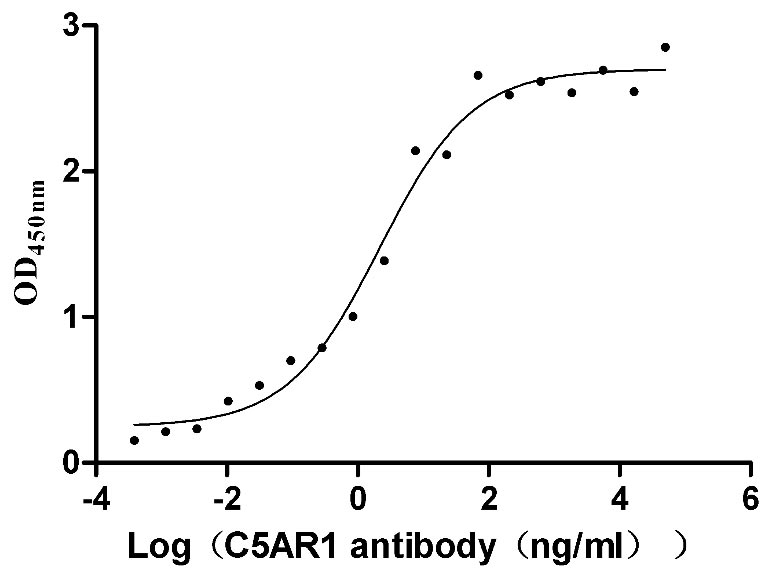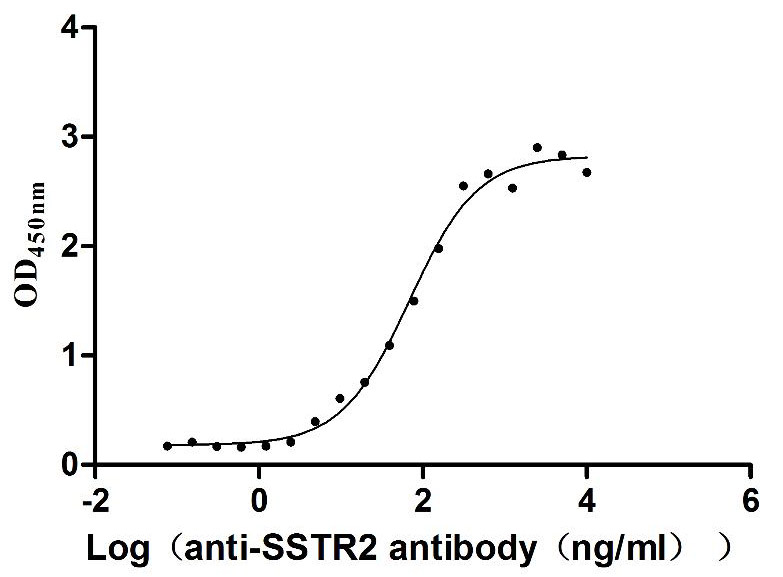Recombinant Mouse Serine/threonine-protein kinase 17B (Stk17b)
-
中文名稱:小鼠Stk17b重組蛋白
-
貨號:CSB-YP805868MO
-
規(guī)格:
-
來源:Yeast
-
其他:
-
中文名稱:小鼠Stk17b重組蛋白
-
貨號:CSB-EP805868MO
-
規(guī)格:
-
來源:E.coli
-
其他:
-
中文名稱:小鼠Stk17b重組蛋白
-
貨號:CSB-EP805868MO-B
-
規(guī)格:
-
來源:E.coli
-
共軛:
-
其他:
-
中文名稱:小鼠Stk17b重組蛋白
-
貨號:CSB-BP805868MO
-
規(guī)格:
-
來源:Baculovirus
-
其他:
-
中文名稱:小鼠Stk17b重組蛋白
-
貨號:CSB-MP805868MO
-
規(guī)格:
-
來源:Mammalian cell
-
其他:
產(chǎn)品詳情
-
純度:>85% (SDS-PAGE)
-
基因名:Stk17b
-
Uniprot No.:
-
別名:Stk17b; Drak2; Serine/threonine-protein kinase 17B; EC 2.7.11.1; DAP kinase-related apoptosis-inducing protein kinase 2
-
種屬:Mus musculus (Mouse)
-
蛋白長度:full length protein
-
表達(dá)區(qū)域:1-372
-
氨基酸序列MSRRRFDCRS VSGLLTTTPQ TPIKTENFNN FYTLTPKELG RGKFAVVRQC ISKSTGQEYA AKSLKKRRRG QDCRAEILHE IAVLELARSC PHVINLHEVY ENATEIILVL EYAAGGEIFN LCLPELAEMV SENDVIRLIK QILEGVHYLH QNNIVHLDLK PQNILLSSIY PLGDIKIVDF GMSRKIGNAS ELREIMGTPE YLAPEILNYD PITTATDMWN IGIIAYMLLT HTSPFVGEDN QETYLNISQV NVDYSEEMFS SVSQLATDFI QSLLVKNPEK RPTAESCLSH SWLQQWDFGS LFHPEETSGS SQIQDLTLRS SEEKTSKSSC NGSCGAREDK ENIPEDGSLV SKRFRFDDSL PSPHELVPDL FC
-
蛋白標(biāo)簽:Tag?type?will?be?determined?during?the?manufacturing?process.
The tag type will be determined during production process. If you have specified tag type, please tell us and we will develop the specified tag preferentially. -
產(chǎn)品提供形式:Lyophilized powder
Note: We will preferentially ship the format that we have in stock, however, if you have any special requirement for the format, please remark your requirement when placing the order, we will prepare according to your demand. -
復(fù)溶:We recommend that this vial be briefly centrifuged prior to opening to bring the contents to the bottom. Please reconstitute protein in deionized sterile water to a concentration of 0.1-1.0 mg/mL.We recommend to add 5-50% of glycerol (final concentration) and aliquot for long-term storage at -20℃/-80℃. Our default final concentration of glycerol is 50%. Customers could use it as reference.
-
儲存條件:Store at -20°C/-80°C upon receipt, aliquoting is necessary for mutiple use. Avoid repeated freeze-thaw cycles.
-
保質(zhì)期:The shelf life is related to many factors, storage state, buffer ingredients, storage temperature and the stability of the protein itself.
Generally, the shelf life of liquid form is 6 months at -20°C/-80°C. The shelf life of lyophilized form is 12 months at -20°C/-80°C. -
貨期:Delivery time may differ from different purchasing way or location, please kindly consult your local distributors for specific delivery time.Note: All of our proteins are default shipped with normal blue ice packs, if you request to ship with dry ice, please communicate with us in advance and extra fees will be charged.
-
注意事項(xiàng):Repeated freezing and thawing is not recommended. Store working aliquots at 4°C for up to one week.
-
Datasheet :Please contact us to get it.
靶點(diǎn)詳情
-
功能:Acts as a positive regulator of apoptosis. Phosphorylates myosin light chains.
-
基因功能參考文獻(xiàn):
- Data provide insight into the role of Drak2 in autoimmune diseases by showing that Drak2 may not suppress TGF-beta signaling in T cells, and therefore may contribute to autoimmune disease via other molecular pathways. PMID: 25951457
- does not function as an essential tumor suppressor or tumor surveillance protein PMID: 25568303
- results demonstrate that DRAK2 plays an important role in primary and memory T cell responsiveness to allografts PMID: 22494341
- DRAK2 and protein kinase D form a novel signaling module that controls calcium homeostasis following T cell activation. PMID: 21148796
- T cells from Drak2(-/-) mice exhibited enhanced sensitivity to T cell receptor-mediated stimulation with a reduced requirement for costimulation PMID: 15589167
- DRAK2 transduces non-apoptotic signals during thymocyte differentiation. PMID: 16172133
- Drak2 expresses in the T cell compartment but is not T cell-specific; it plays critical roles in T cell apoptosis and memory T cell development PMID: 16517594
- DRAK2 kinase activity is regulated in a calcium-dependent manner and that Ser(12) phosphorylation is necessary for optimal suppression of T cell activation by this kinase PMID: 17182616
- DRAK2 may be a novel target for stimulating protective immunity to viral pathogens PMID: 17966037
- DRAK2 may have a role in regulating the GC reaction and the response to thymus-dependent antigens, and DRAK2-deficiency is not involved in regulating intrinsic B-cell apoptosis. PMID: 18568639
- reduced viral load in the brains of Drak2(-/-) mice PMID: 18641347
- Drak2 overexpression led to aggravated beta-cell apoptosis triggered by free fatty acids (FFA) by compromising the increase of anti-apoptotic factors, such as Bcl-2, Bcl-xL and Flip, upon FFA assault PMID: 18777517
- Drak2 regulates the survival of activated T cells and is required for organ-specific autoimmune disease PMID: 19017948
- DRAK2 blockade may lead to permanent autoimmune T cell destruction via intrinsic apoptosis pathways. PMID: 19017949
- p70S6 kinase was a bona fide Drak2 substrate PMID: 19342653
顯示更多
收起更多
-
亞細(xì)胞定位:Nucleus. Cell membrane. Endoplasmic reticulum-Golgi intermediate compartment.
-
蛋白家族:Protein kinase superfamily, CAMK Ser/Thr protein kinase family, DAP kinase subfamily
-
數(shù)據(jù)庫鏈接:
Most popular with customers
-
Recombinant Human Tumor necrosis factor ligand superfamily member 8 (TNFSF8), partial (Active)
Express system: Mammalian cell
Species: Homo sapiens (Human)
-
Recombinant Human C5a anaphylatoxin chemotactic receptor 1 (C5AR1)-VLPs (Active)
Express system: Mammalian cell
Species: Homo sapiens (Human)
-
Recombinant Mouse Retinol-binding protein 4 (Rbp4) (Active)
Express system: Mammalian cell
Species: Mus musculus (Mouse)
-
Recombinant Human Somatostatin receptor type 2 (SSTR2)-VLPs (Active)
Express system: Mammalian cell
Species: Homo sapiens (Human)
-
Recombinant Mouse Claudin-18 (Cldn18)-VLPs (Active)
Express system: Mammalian cell
Species: Mus musculus (Mouse)
-
Recombinant Dog B-lymphocyte antigen CD20 (MS4A1)-VLPs (Active)
Express system: Mammalian cell
Species: Canis lupus familiaris (Dog) (Canis familiaris)
-
Recombinant Mouse Complement component C1q receptor (Cd93), partial (Active)
Express system: Mammalian cell
Species: Mus musculus (Mouse)
-
Recombinant Human Claudin-6 (CLDN6)-VLPs, Fluorescent (Active)
Express system: Mammalian cell
Species: Homo sapiens (Human)






-AC1.jpg)


f4-AC1.jpg)








